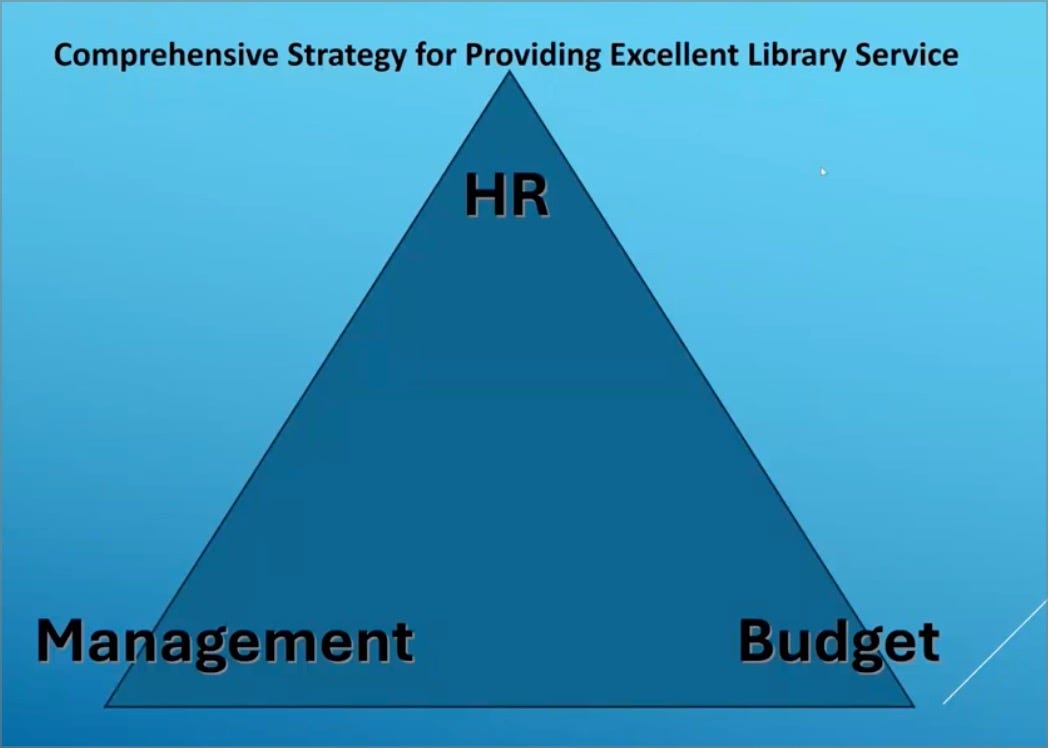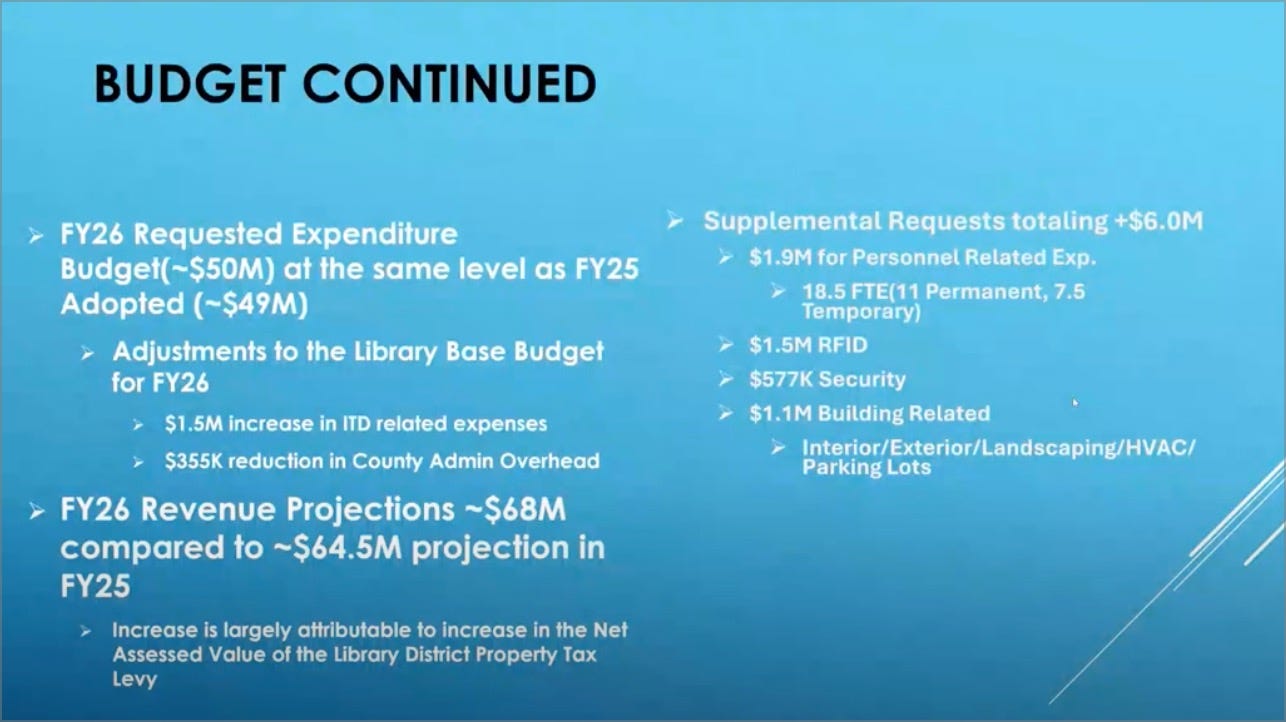🏛️ Hope and Challenges: The State of Pima Public Libraries Today
Join Steve Holmes in addressing equity challenges and the fight for essential library services in Tucson.
😽 Keepin’ It Simple Summary for Younger Readers
👧🏾✊🏾👦🏾
📚 Public libraries are important places where people can borrow books and take advantage of various programs. 🏛️ Recently, in Tucson, there have been some worries about the future of these libraries, including the possibility of them losing 💰 money and closing down. ❌ A new leader has been appointed to help make things better, and it's important for the community to speak up 📢 and make sure that libraries remain accessible for everyone. 🤝
🗝️ Takeaways
📖 Libraries are crucial community hubs providing resources for everyone, especially vulnerable populations.
🚨 Recent meetings revealed significant issues of resource diversion and potential library closures.
👥 New Library Director Steve Holmes brings experience that could help center marginalized voices in library policy.
💵 Concerns exist over library tax funds being redirected to other programs, jeopardizing core library services.
🛑 Community engagement is essential to protect library resources and advocate for equitable access.
The State of Our Libraries: Hope, Challenges, and the Fight for Equitable Access
A Critical Analysis of February's Library Board Meeting Through a Lens of Social Justice & Community Empowerment
"In partnership with native nations, PCPL advocates for full access to its educational, informational, and recreational resources." - Yet actions speak louder than land acknowledgments.
Today's public libraries are more than book repositories—they are vital community hubs providing essential services to our most vulnerable populations. February's Library Advisory Board meeting revealed patterns of resource diversion, potential displacement, and service disruptions that disproportionately impact Indigenous, immigrant, and working-class communities.
A New Dawn for Library Leadership?
In a moment of potential transformative change, Steve Holmes steps into library oversight, bringing both lived experience and a proven track record of educational equity from his tenure at Sunnyside School District. His personal narrative resonates deeply with our community's struggles:
"I grew up first 3 years of my life for 4 years and county chambers... where the library played a key role in my life growing up with Hispanic household. That was the only library where he had access to bilingual books at that time in the 70s."
This appointment represents a historic opportunity to center marginalized voices in library policy. Holmes's background in Sunnyside—where he advanced from teacher to superintendent while serving primarily working-class and immigrant families—indicates a capacity for leadership that views libraries as instruments for social transformation.
Doublespeak & Displacement?
Let's cut through the administrative jargon and expose what's really happening in our library system. While officials repeat, "No libraries are closing," their own discussions reveal a different reality:
El Pueblo Library - Community Hub or Administrative Space?
When pressed about restoring El Pueblo's hours, the Deputy Director's response was tellingly evasive:
"What we need to do is a revaluation of where the staffing is now... Our hope is that with the addition of FTE that we are able to do strategic expansion."
This bureaucratic language masks a crucial fact: the Frank De La Cruz-El Pueblo Library, located in Supervisor Grijalva’s district on the south side of Tucson, faces the transition to CEO (community engagement) offices.
The community deserves direct answers: Will it remain a full-service library or become another administrative space removed from public use?
Main Library - The Wells Fargo Shuffle
Despite administrators stating, "We're not closing any libraries, I just want to say that for the record," the detailed discussion of moving to the Wells Fargo building reveals the truth.
Board members raised crucial concerns about this banker's vision of a "public" library:
"That building was built to be a bank"
"not really a public welcoming place."
"not a lot of sunlight."
Limited parking access
The Hidden Crisis: By The Numbers
Service Disruption Analysis (December 2024):
The PEEPS Funding Controversy: Your Tax Dollars at Work?
A critical revelation emerged about the diversion of library tax funds to PEEPS (Pima Early Education Program). While early education is vital, this reallocation raises serious questions about:
Transparency in fund usage
Voter intent for library taxes
Impact on core library services
Legal basis for diversion
The discussion revealed confusion even among board members about timing and amounts, suggesting a concerning lack of transparency in how these public funds are being redirected away from library services.
A critical examination of library tax allocation reveals concerning patterns:
This diversion of funds affects:
Collection development
Operating hours
Staffing levels
Facility maintenance
Main Library Crisis: The Human Cost
The potential displacement of downtown library services signifies more than just a change of location—it risks disrupting essential community networks. As board member Marianne powerfully expressed:
"This downtown library serves 27 neighborhoods and barrios... A lot of people walk to this library and it's also a center for just huge culture when you think, you know, other programming, the most reading is available..."
Community Assets at Risk:
Walking distance access for 27 neighborhoods
Free public meeting spaces
Computer/internet access
Climate-controlled refuge
Cultural programming space
Unmasking Power Structures and Building Community Resistance
Budget Reality Check: Who Really Pays?
When we dive deeper into the proposed $6 million in supplemental requests, we see critical needs that disproportionately impact our most vulnerable community members:
Supplemental Budget Breakdown & Community Impact:
As Anthony Batchelder revealed in his presentation:
"Libraries of our size in our community have usually a $75 million budget region. So like that's something to kind of consider as well, right? We're trying to incrementally get to these points."
This underfunding represents systematic disinvestment in public infrastructure that serves our most marginalized communities.
Security Incidents: The Deeper Story
A closer analysis of security incidents reveals concerning patterns:
Incident Distribution by Branch Type:
This concentration of reported incidents in urban core libraries masks a deeper story about:
Need for social services
Mental health support
Housing assistance
Substance abuse treatment
The focus on security response rather than community support perpetuates cycles of criminalization.
Cultural Programming: Resistance Through Representation
The Tucson Festival of Books programming represents both progress and opportunity:
Panel Focus Areas:
Immigration & Border Justice
Alejandro Liva: Border interpreter experiences
Paola Ramos: Political analysis
First-hand migration narratives
Indigenous Voices
Tom Holm (Cherokee Nation)
Daniel Van Diver (local advocate)
Miss Redcherry (poet)
LGBTQ+ Intersectionality
Edgar Gomez
Adriana Herrera
Focus on diverse experiences
Community Survey: Who's Being Heard?
Current survey response demographics reveal systemic barriers to participation:
Call to Action: Building Community Power
Immediate Actions Needed:
Attend Library Board Meetings
Next meeting: First Thursday of the Month
Location: Joel D. Valdez Main Library
Public comment period available
Document and Report
Service disruptions
Access barriers
Community needs
Success stories
Organize Your Community
Form neighborhood committees
Create phone trees
Share information
Support vulnerable patrons
The Path Forward: Hope Through Action
Under Steve Holmes's leadership, we have a unique opportunity to transform our library system. His background suggests an understanding of:
Educational equity
Immigrant community needs
Bilingual services importance
Community engagement
However, this potential can only be realized through sustained community pressure and engagement. We must:
Hold leadership accountable
Demand transparent decision-making
Protect community spaces
Ensure equitable resource distribution
Conclusion: The Stakes Are Clear
The struggle for equitable library access represents more than books and buildings - it's about:
Community self-determination
Cultural preservation
Educational access
Economic opportunity
Social justice
The decisions made in the coming months will shape access to knowledge and community spaces for generations.
Remember: Every lunch hour closure, every denied resource, and every displaced service represents a barrier to community empowerment. Together, we must ensure our library system serves all people, especially those most marginalized by systemic inequities.
La lucha continúa. The struggle continues.
[The next report will track the implementation of promises made and community response to proposed changes.]
📚 Your Voice Matters: Participate in the Library Survey!
😽 Keepin’ It Simple Summary for Younger Readers













